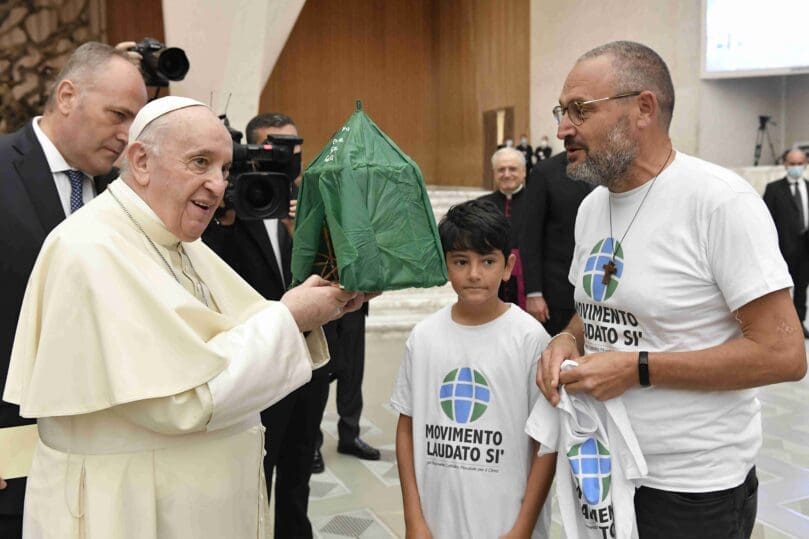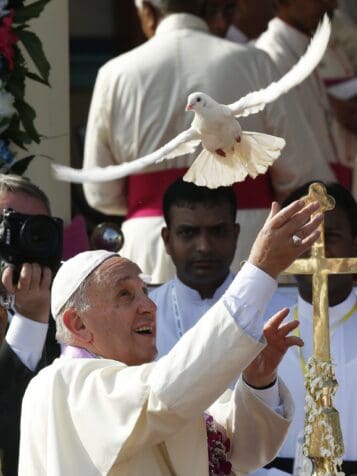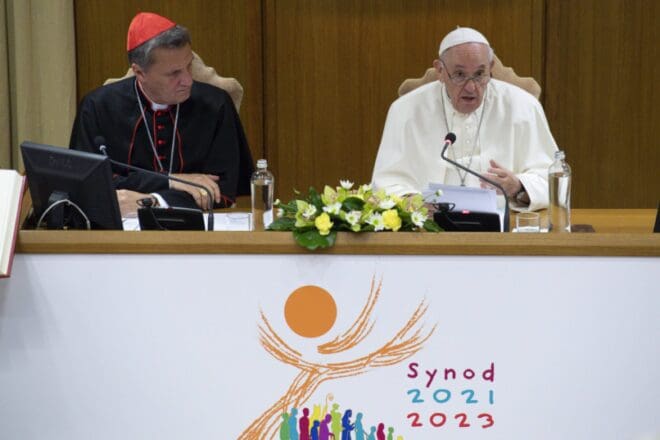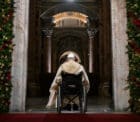 CNS Photo/Vatican Media
CNS Photo/Vatican MediaAtlanta
Atlanta Catholics reflect on a decade of Pope Francis’ leadership
By ANDREW NELSON, Staff Writer | Published March 31, 2023
ATLANTA—The church celebrated in March a decade with Pope Francis as its leader.
He has traveled to visit migrants and refugees, prayed with the world during the COVID-19 pandemic and emphasized the church should be a field hospital of mercy. Born in Argentina, he is the 266th pontiff in the chair of St. Peter. Since he appeared on the balcony of St. Peter’s Basilica, Pope Francis repeatedly calls for a faith community that embraces inclusion and solidarity by accompanying the poor.
The Georgia Bulletin asked people in the Archdiocese of Atlanta to share how they have been shaped by the pontificate. Here’s what they said:
Father Mark Starr, pastoral perspective
For Father Mark Starr, seeing Pope Francis wash the feet of a diversity of people during Mass on Holy Thursday, from prisoners and women to young people, has been a touchstone of the pontificate.
That set the stage for who he is, a welcoming pastor, said Father Starr, a priest of 11 years. He recently stepped down as leader of the archdiocesan council of priests.
In the past, it was disputed whether it was appropriate for women to have their feet washed. Critics stressed the rite imitates Jesus washing the feet of the 12 male apostles at the Last Supper. In 2016, Pope Francis ended the discussion when he decreed the participants in the ritual be “those chosen from amongst the people of God.”
Pope Francis has not changed doctrine or dogma, but has invited people who have felt estranged back into the church, he said.

Pope Francis releases a dove at the Sanctuary of Our Lady of the Rosary in Madhu, Sri Lanka, Jan. 14, 2015. CNS photo/Paul Haring
“He’s not changing doctrine and he can’t change dogma, but he’s brought a compassionate and pastoral sensitivity to it and certainly raised our awareness of the need to minister to the poor, the downcast, the downtrodden, those separated from the church for whatever reason,” said Father Starr.
For churchgoers, Pope Francis streamlined the annulment process to help people rectify marriage situations and opened up the church to a form of collaboration with the global synod, he said.
“What Francis says is, we’re not afraid to bring anything to the table. It doesn’t mean that we’re going to acquiesce to those desires, but we’re not afraid to have discourse over things,” said Father Starr, who organized a handful of parish events with the 2022 synod, including with teens.
“I tell my kids all the time, ask the hard questions. Ask me anything personal. It doesn’t matter. I’m not afraid of your question. The pope isn’t either,” he said about his young parishioners.
Father Starr said Pope Francis’ “Evangelii Gaudium” (Joy of the Gospel) is a road map to understand his vision of the church.
“There are Christians whose lives seem like Lent without Easter,” said the priest, quoting from the encyclical.
In contrast, the pope wants the church to take “an approach that’s spreading the joy of the Gospel, which is my music. That’s my thing. When it came out, several of my friends in seminary texted or called me and said, hey, the pope is speaking your language.”
At the decade mark, Father Starr said the pope’s impact will be felt for the long term. “I don’t think people are really going to appreciate him until 20 years after he’s gone. He has brought a balancing act, and it’s a difficult balancing.”
Brian Savoie, Laudato Si perspective
The environment has long been a concern for the papacy, said Brian Savoie, the sustainability program coordinator for the Archdiocese of Atlanta’s Laudato Si’ Initiative.
In 1971, Pope Paul VI wrote about “an ill-considered exploitation of nature.” During his long pontificate, St. John Paul II introduced the concept how humans are responsible for the natural world with stewardship. He wrote how abusing the environment could violate the Seventh Commandment mandate not to steal because the degradation was stealing the earth’s future from generations to come.
Pope Francis “is standing on very broad shoulders” as he has taken concern for the Earth and drawn the links with faith even tighter, said Savoie.
On the first day, he selected his name Francis, which captured Catholic imagination for concern for the earth and the poor by “embodying the spirit of St. Francis of Assisi,” he said.
But more than just imagination, Catholics have seen the pope engaged on the issue of the environment. His 2015 Laudato Si’ was a landmark that helped drive the global conversation. He advised people to be ecologically minded and care for the planet.
He’s warned executives from oil and gas companies at Vatican meetings about the dangers of continued reliance on fossil fuels. “He’s not calling for understanding (the issue) anymore. He’s calling for action,” said Savoie.
Building on his predecessors, Pope Francis has highlighted how the environment, economics and human development overlap and need to be weighed together, he said. Pope Francis called for a better understanding of “integral economy” where people view how life is interconnected and interdependent, he said.
For 10 years, Pope Francis has built on the work of his predecessors. Said Savoie, “by his actions and words, he has solidified my belief that we should see God’s greatness in nature.”
“The richness, the complexity, the beauty, the fact that it costs us nothing. You don’t have to work to have nature. You just have to be in it,” he said.
Pope Francis has stressed a connection between nature and people, an understanding how we treat nature could reflect on how we treat people, especially the marginalized, Savoie said. If the natural world is seen as something to be abused without consequence, the women and men who already suffer will be burdened more. “That was just something I was maybe a little blind to or didn’t really click on.”
Kyle McCaffery, Synod on Synodality perspective
Pope Francis’ initiative with the Synod on Synodality is not an innovation, but comes out of Vatican Council II reforms, with deeper roots in the early Christian era. Kyle McCaffery said Pope Francis instead has expanded how synodality is lived in the church.

Pope Francis speaks as Maltese Cardinal Mario Grech, secretary-general of the Synod of Bishops, looks on during a meeting with representatives of bishops’ conferences from around the world at the Vatican in this Oct. 9, 2021, file photo.CNS photo/Paul Haring
In the past, a synod was seen as gathering of bishops only. But Pope Francis has broadened that vision to include bishops and the laity, where believers and even nonbelievers are welcomed and heard.
McCaffery explained how a Vatican document described what is happening with the Synod on Synodality is “enlarging the space of [our] tent.”
McCaffery worships at St. Anthony of Padua Church, Atlanta, and works as a campus minister at Marist School. He previously taught at Our Lady of Mercy High School. He served as a member of the archdiocesan Synod Outreach Team and a continental delegate, representing the archdiocese in national conversations with other Catholics.
As a young adult, he first became aware of this form of being church during the Synod on the Youth in 2018. He found it exciting how decision makers of the church, particularly the pope and other bishops, were interested in hearing about his experience, the faith of other young adults, and then enriched their experiences from a global perspective, he said.
Before this, he said he felt a growing sense that leaders “were oblivious to my concerns, my needs, my hopes and my spiritual experiences.”
The synod on youth was followed by Synod on the Amazon in 2019 and the ongoing Synod on Synodality. McCaffery said he felt his role and participating in the process was “a way to feel in communion and co-responsible with the church around the world.”
With the synods, Pope Francis has challenged Catholics to see themselves as part of a global church, he said. In the United States, churchgoers risk a limited understanding of what it means to be a member of the global church, but the synods and the conversations around them have opened up how communities across the world are living out the Gospel in different ways, he said.
Pope Francis’ words taught McCaffery to understand evangelization in new ways, with his witness as a global pastor and a creative leader during the COVID-19 pandemic, he said.
“More than ever, I feel that being Catholic is a gift of belonging to a beautifully diverse global community united as followers of Jesus,” he said.
